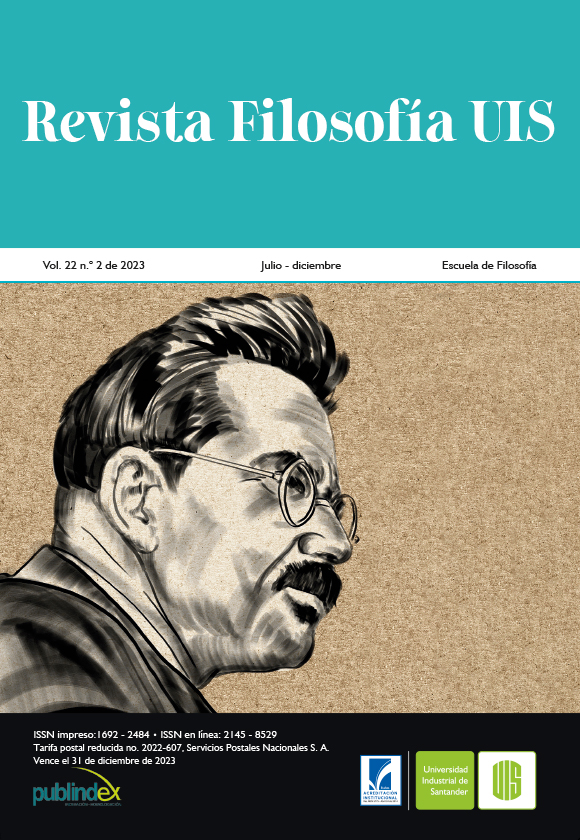The abandonment of the «enlightened» humanistic project. Notes for an «eccentric ethics»
Published 2023-07-05
Keywords
- ethics,
- post-humanism,
- cynicism,
- compassion,
- anthropocentrism
How to Cite
Copyright (c) 2023 Revista Filosofía UIS

This work is licensed under a Creative Commons Attribution 4.0 International License.
Abstract
This article seeks to envision, from the field of the claims of humanism, the possibility of an ethic devoid of a «center» that is based on «compassion». It will seek to understand the need to abandon attempts to return to the «humanistic» project to try to formulate a non-anthropocentric ethics to avoid its greatest risk: the «enlightened cynic». Additionally, «humanism» will be considered as the solemn flash of a «star that died long ago» but that gives signals for the construction of an eccentric ethic founded on compassion and pain. For such purposes, three sections will be presented: a) the humanist an enlightened cynic b) evasion mechanisms. Poverty and the bourgeois way of life and c) the absence of a center and the possibility of an eccentric ethic.
Downloads
References
- Cardona, L. F. (2019). El sufrimiento humano como pauta ética. Revista Facultad Nacional de Salud Pública «Hector Abad Gómez», 37(1), 55-63. https://doi.org/10.17533/udea.rfnsp.339735
- Cassel, E. (1982). The Nature of Suffering and the Goals of Medicine. New England Journal of Medicine, 306(11), 369-645. https://doi.org/10.1056/NEJM198203183061104
- Deleuze, G. y Guattari, F. (2001). Rizoma: Introducción (C. Casillas y V. Navarro, trads.; 3a ed.). Ediciones Coyoacán.
- Deleuze, G. y Guattari, F. (2015). Mil mesetas capitalismo y esquizofrenia (J. Vásquez, trad.). Pretextos.
- Derrida, J. y Dufourmantelle, A. (2014). La hospitalidad (M. Segoviano, trad.; 4a edición). Ediciones de la Flor.
- Fabris, A. (2020). Por un nuevo humanismo hoy (M. C. Llenera del Castillo, trad.). Cuestiones de Filosofía, 6(26), 15-28. https://doi.org/10.19053/01235095.v6.n26.2020.11164
- Fukuyama, F. (2003). El fin del hombre: Consecuencias de la revolución biotecnológica. Ediciones B Grupo Zeta.
- Gil, R. (2007). Neuropsicología (A. Arroyo y E. María, trads.; 4.a ed.). Elsevier Masson.
- Grondin, J. (2002). Introducción a la hermenéutica filosófica. Herder.
- Grondin, J. (2003). Introducción a Gadamer (C. Ruiz-Garrido, trad.). Herder.
- Guillazo Blanch, G., Redolarm Ripoll, A., Torras García, M. y Vale Martínez, A. (2007). Fundamentos de neurociencia (C. Soriano Mas, Ed.; 1a edición en lengua castellana). Editorial UOC.
- Habermas, J. (2002). El futuro de la naturaleza humana: ¿Hacia una eugenesia liberal? Paidós.
- Heidegger, M. (2012). Sein und Zeit (J. E. Rivera, trad.). Trotta.
- Heidegger, M. (2014a). Época de la imagen del mundo. En H. Cortés y A. Leyte (Trads.), Caminos de bosque (pp. 63-90). Alianza.
- Heidegger, M. (2014b). Carta sobre el humanismo. En H. Cortés y A. Leyte (Trads.), Hitos. Alianza Editorial.
- Heidegger, M. (2015). Construir Habitar Pensar: Bauen Wohnen Denken (J. A. Escudero, trad.). LaOficina.
- Hölderlin, F. (2014). Poemas (E. Gil Bera, trad.). Debolsillo.
- Kurtz, P. y Madigan, T. J. (1989). Eupraxophy, Ethics, and Secular Humanism. Free Inquiry, 09(2), 4-5.
- Levinas, E. (2012). Totalidad e infinito. Ensayo sobre la exterioridad. Ediciones Sígueme.
- Lyotard, J. F. (2008). La posmodernidad: (Explicada a los niños) (9a. reimp). Gedisa.
- Mazzetti, C. (2017). Nombrar la muerte. Aproximaciones a lo indecible. Andamios, 14(33), 46-76.
- Mèlich, J. C. (2010). Ética de la compasión. Herder.
- Mèlich, J. C. (2014). Lógica de la crueldad. Herder.
- More, M. (1990). Transhumanism: Towards a Futurist Philosophy. Extropy, 6, 6-12.
- Pearce, D. (s. f.). The Hedonist Imperative. David Pearce. Recuperado 8 de marzo de 2023, de http://www.hedweb.com/hedonist.htm
- Rosenzweig, M. R., Breedlove, S. M., Watson, N. V. y Morgado Bernal, I. (2005). Psicobiología: Una introducción a la neurociencia conductual, cognitiva y clínica (2a ed., act). Ariel.
- Sloterdijk, P. (2011). Sin salvación: Tras las huellas de Heidegger. Akal.
- Sloterdijk, P. (2012). Has de cambiar tu vida: Sobre antropotécnica (P. Madrigal, trad.). Pre-Textos.
- Sloterdijk, P. (2019). Crítica de la razón cínica (M. Á. Vega Cernuda, trad.). Siruela.
- Sófocles. (2006). Tragedias (A. Alamillo, trad.). Gredos.
- Svenaeus, F. (2020). To die well: The phenomenology of suffering and end of life ethics. Medicine, Health Care and Philosophy, 23(3), 335-342. https://doi.org/10.1007/s11019-019-09914-6
- Unamuno, M. (2011). Del sentimiento trágico de la vida. Austral.
- Valero Sánchez, G. J. (2019). La visión de lo sagrado: Religiosidad en Hölderlin y Nietzsche. Revista Filosofía UIS, 18(1), 207-221. https://doi.org/10.18273/revfil.v18n1-2019010
- Valle, J. (2018). Dolor y autoexplotación en la era digital. Contrastes. Revista Internacional de Filosofía, XXIII(3), 163-180.
- Van Hooft, S. (1998). Suffering an the Goals of Medicine. 1, 125-131.

